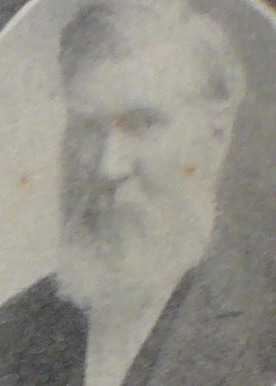Encyclopedia Dubuque
"Encyclopedia Dubuque is the online authority for all things Dubuque, written by the people who know the city best.”
Marshall Cohen—researcher and producer, CNN
Affiliated with the Local History Network of the State Historical Society of Iowa, and the Iowa Museum Association.
QUIGLEY, Patrick J.: Difference between revisions
No edit summary |
No edit summary |
||
| Line 1: | Line 1: | ||
[[Image:P1000311.jpg|left|thumb|150px|Patrick J. Quigley. Photo courtesy: Bob Reding]]QUIGLEY, Patrick J. (Binghamton, NY, June I, 1837-Dubuque, IA, Feb. 28, 1917). | [[Image:P1000311.jpg|left|thumb|150px|Patrick J. Quigley. Photo courtesy: Bob Reding]]QUIGLEY, Patrick J. (Binghamton, NY, June I, 1837-Dubuque, IA, Feb. 28, 1917). Quigley, the son of John Quigley, came to Dubuque County with his parents. His father farmed, and Patrick held a variety of jobs in Iowa, Minnesota and the western United States including surveyor, farmer, and grocer. (1) | ||
In 1881 Quigley started the ''Dubuque Democrat,''a local newspaper. (3) Within a few years, he purchased a half-interest in the ''Dubuque Telegraph'' which had been started on July 5, 1870 by [[MAHONY, Dennis|Dennis MAJONY]]. (4) He remained with the paper only one year before selling his interest to Mahony's widow. A brief interest in living in South Dakota was ended when drought struck. Quigley hurried back to Dubuque and joined the ''Democrat'', a paper founded as a result of a strike against the ''Telegraph.'' He soon also repurchased his interest in the "Telegraph" and then merged the papers in 1884. (5) | |||
Quigley | Quigley's "Telegraph" strongly supported its allies and politics and attacking those with which it did not agree. This led to Quigley often being named a defendant in libel suits. A colorful person, he sat outside during slow times at the paper and clipped his nails while watching the activity. Susceptible to chest colds, he wore a long beard and stuffed copies of the newspaper under his overcoat to insulate him from cold. (6) | ||
With the merger of the ''Telegraph'' and ''Herald'' on November 1, 1901, Quigley became the business manager and eventually the publisher. | |||
Beyond an interest in the paper, Quigley contributed generously to those who suffered from natural or man-made calamities. Through his efforts, five thousand dollars in preferred stock of the ''Telegraph-Herald'' were given to [[FINLEY HOSPITAL (THE)]], Dubuque Boys' Welfare Association, [[SAINT VINCENT de PAUL]], St. Joseph's Mercy Hospital, [[SAINT ANTHONY'S HOME FOR THE AGED]], the House of the Good Shepherd, [[MOUNT PLEASANT HOME]], and the St. Francis Home. | Beyond an interest in the paper, Quigley contributed generously to those who suffered from natural or man-made calamities. Through his efforts, five thousand dollars in preferred stock of the ''Telegraph-Herald'' were given to [[FINLEY HOSPITAL (THE)]], Dubuque Boys' Welfare Association, [[SAINT VINCENT de PAUL]], St. Joseph's Mercy Hospital, [[SAINT ANTHONY'S HOME FOR THE AGED]], the House of the Good Shepherd, [[MOUNT PLEASANT HOME]], and the St. Francis Home. | ||
| Line 10: | Line 12: | ||
Source: | Source: | ||
1. Cooper, Brian "8 Publishers Forged the Vision, ''Telegraph Herald Commemorative Edition: Past, Present and Future'', March 26, 2012, p. 5A | |||
2. Ibid. | |||
3. Ibid. | |||
4. Ibid. | |||
5. Ibid. | |||
6. Ibid. | |||
Goodspeed, Weston A. History of Dubuque County, Iowa; ed. by F. T. Oldt and P. J. Quigley; Chicago: Goodspeed Historical Association, 1911 | Goodspeed, Weston A. History of Dubuque County, Iowa; ed. by F. T. Oldt and P. J. Quigley; Chicago: Goodspeed Historical Association, 1911 | ||
Revision as of 22:10, 7 December 2014
QUIGLEY, Patrick J. (Binghamton, NY, June I, 1837-Dubuque, IA, Feb. 28, 1917). Quigley, the son of John Quigley, came to Dubuque County with his parents. His father farmed, and Patrick held a variety of jobs in Iowa, Minnesota and the western United States including surveyor, farmer, and grocer. (1)
In 1881 Quigley started the Dubuque Democrat,a local newspaper. (3) Within a few years, he purchased a half-interest in the Dubuque Telegraph which had been started on July 5, 1870 by Dennis MAJONY. (4) He remained with the paper only one year before selling his interest to Mahony's widow. A brief interest in living in South Dakota was ended when drought struck. Quigley hurried back to Dubuque and joined the Democrat, a paper founded as a result of a strike against the Telegraph. He soon also repurchased his interest in the "Telegraph" and then merged the papers in 1884. (5)
Quigley's "Telegraph" strongly supported its allies and politics and attacking those with which it did not agree. This led to Quigley often being named a defendant in libel suits. A colorful person, he sat outside during slow times at the paper and clipped his nails while watching the activity. Susceptible to chest colds, he wore a long beard and stuffed copies of the newspaper under his overcoat to insulate him from cold. (6)
With the merger of the Telegraph and Herald on November 1, 1901, Quigley became the business manager and eventually the publisher.
Beyond an interest in the paper, Quigley contributed generously to those who suffered from natural or man-made calamities. Through his efforts, five thousand dollars in preferred stock of the Telegraph-Herald were given to FINLEY HOSPITAL (THE), Dubuque Boys' Welfare Association, SAINT VINCENT de PAUL, St. Joseph's Mercy Hospital, SAINT ANTHONY'S HOME FOR THE AGED, the House of the Good Shepherd, MOUNT PLEASANT HOME, and the St. Francis Home.
---
Source:
1. Cooper, Brian "8 Publishers Forged the Vision, Telegraph Herald Commemorative Edition: Past, Present and Future, March 26, 2012, p. 5A
2. Ibid.
3. Ibid.
4. Ibid.
5. Ibid.
6. Ibid.
Goodspeed, Weston A. History of Dubuque County, Iowa; ed. by F. T. Oldt and P. J. Quigley; Chicago: Goodspeed Historical Association, 1911
"Irish in Iowa," Online: http://www.celticcousins.net/irishiniowa/irelandbios9.htm#quigley


